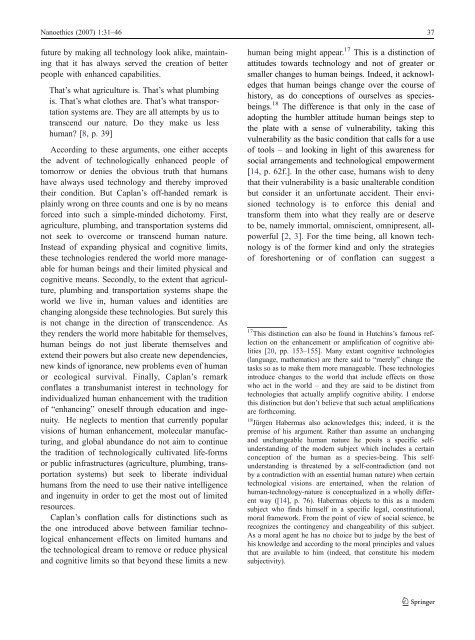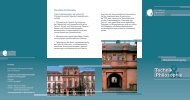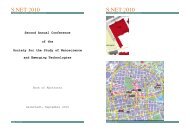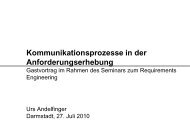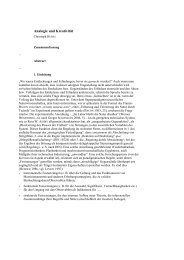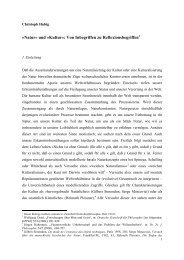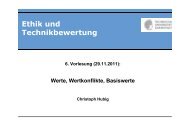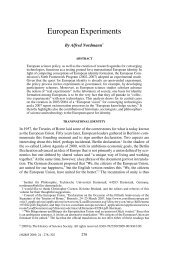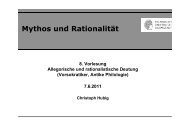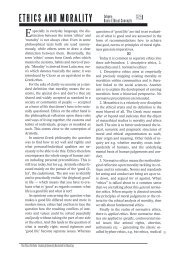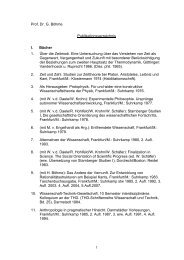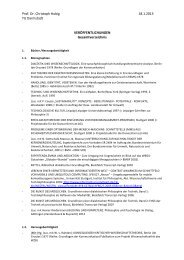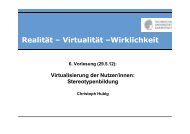If and Then: A Critique of Speculative NanoEthics - Common Sense ...
If and Then: A Critique of Speculative NanoEthics - Common Sense ...
If and Then: A Critique of Speculative NanoEthics - Common Sense ...
Create successful ePaper yourself
Turn your PDF publications into a flip-book with our unique Google optimized e-Paper software.
Nanoethics (2007) 1:31–46 37<br />
future by making all technology look alike, maintaining<br />
that it has always served the creation <strong>of</strong> better<br />
people with enhanced capabilities.<br />
That’s what agriculture is. That’s what plumbing<br />
is. That’s what clothes are. That’s what transportation<br />
systems are. They are all attempts by us to<br />
transcend our nature. Do they make us less<br />
human? [8, p. 39]<br />
According to these arguments, one either accepts<br />
the advent <strong>of</strong> technologically enhanced people <strong>of</strong><br />
tomorrow or denies the obvious truth that humans<br />
have always used technology <strong>and</strong> thereby improved<br />
their condition. But Caplan’s <strong>of</strong>f-h<strong>and</strong>ed remark is<br />
plainly wrong on three counts <strong>and</strong> one is by no means<br />
forced into such a simple-minded dichotomy. First,<br />
agriculture, plumbing, <strong>and</strong> transportation systems did<br />
not seek to overcome or transcend human nature.<br />
Instead <strong>of</strong> exp<strong>and</strong>ing physical <strong>and</strong> cognitive limits,<br />
these technologies rendered the world more manageable<br />
for human beings <strong>and</strong> their limited physical <strong>and</strong><br />
cognitive means. Secondly, to the extent that agriculture,<br />
plumbing <strong>and</strong> transportation systems shape the<br />
world we live in, human values <strong>and</strong> identities are<br />
changing alongside these technologies. But surely this<br />
is not change in the direction <strong>of</strong> transcendence. As<br />
they renders the world more habitable for themselves,<br />
human beings do not just liberate themselves <strong>and</strong><br />
extend their powers but also create new dependencies,<br />
new kinds <strong>of</strong> ignorance, new problems even <strong>of</strong> human<br />
or ecological survival. Finally, Caplan’s remark<br />
conflates a transhumanist interest in technology for<br />
individualized human enhancement with the tradition<br />
<strong>of</strong> “enhancing” oneself through education <strong>and</strong> ingenuity.<br />
He neglects to mention that currently popular<br />
visions <strong>of</strong> human enhancement, molecular manufacturing,<br />
<strong>and</strong> global abundance do not aim to continue<br />
the tradition <strong>of</strong> technologically cultivated life-forms<br />
or public infrastructures (agriculture, plumbing, transportation<br />
systems) but seek to liberate individual<br />
humans from the need to use their native intelligence<br />
<strong>and</strong> ingenuity in order to get the most out <strong>of</strong> limited<br />
resources.<br />
Caplan’s conflation calls for distinctions such as<br />
the one introduced above between familiar technological<br />
enhancement effects on limited humans <strong>and</strong><br />
the technological dream to remove or reduce physical<br />
<strong>and</strong> cognitive limits so that beyond these limits a new<br />
human being might appear. 17 This is a distinction <strong>of</strong><br />
attitudes towards technology <strong>and</strong> not <strong>of</strong> greater or<br />
smaller changes to human beings. Indeed, it acknowledges<br />
that human beings change over the course <strong>of</strong><br />
history, as do conceptions <strong>of</strong> ourselves as speciesbeings.<br />
18 The difference is that only in the case <strong>of</strong><br />
adopting the humbler attitude human beings step to<br />
the plate with a sense <strong>of</strong> vulnerability, taking this<br />
vulnerability as the basic condition that calls for a use<br />
<strong>of</strong> tools – <strong>and</strong> looking in light <strong>of</strong> this awareness for<br />
social arrangements <strong>and</strong> technological empowerment<br />
[14, p. 62f.]. In the other case, humans wish to deny<br />
that their vulnerability is a basic unalterable condition<br />
but consider it an unfortunate accident. Their envisioned<br />
technology is to enforce this denial <strong>and</strong><br />
transform them into what they really are or deserve<br />
to be, namely immortal, omniscient, omnipresent, allpowerful<br />
[2, 3]. For the time being, all known technology<br />
is <strong>of</strong> the former kind <strong>and</strong> only the strategies<br />
<strong>of</strong> foreshortening or <strong>of</strong> conflation can suggest a<br />
17 This distinction can also be found in Hutchins’s famous reflection<br />
on the enhancement or amplification <strong>of</strong> cognitive abilities<br />
[20, pp. 153–155]. Many extant cognitive technologies<br />
(language, mathematics) are there said to “merely” change the<br />
tasks so as to make them more manageable. These technologies<br />
introduce changes to the world that include effects on those<br />
who act in the world – <strong>and</strong> they are said to be distinct from<br />
technologies that actually amplify cognitive ability. I endorse<br />
this distinction but don’t believe that such actual amplifications<br />
are forthcoming.<br />
18 Jürgen Habermas also acknowledges this; indeed, it is the<br />
premise <strong>of</strong> his argument. Rather than assume an unchanging<br />
<strong>and</strong> unchangeable human nature he posits a specific selfunderst<strong>and</strong>ing<br />
<strong>of</strong> the modern subject which includes a certain<br />
conception <strong>of</strong> the human as a species-being. This selfunderst<strong>and</strong>ing<br />
is threatened by a self-contradiction (<strong>and</strong> not<br />
by a contradiction with an essential human nature) when certain<br />
technological visions are entertained, when the relation <strong>of</strong><br />
human-technology-nature is conceptualized in a wholly different<br />
way ([14], p. 76). Habermas objects to this as a modern<br />
subject who finds himself in a specific legal, constitutional,<br />
moral framework. From the point <strong>of</strong> view <strong>of</strong> social science, he<br />
recognizes the contingency <strong>and</strong> changeability <strong>of</strong> this subject.<br />
As a moral agent he has no choice but to judge by the best <strong>of</strong><br />
his knowledge <strong>and</strong> according to the moral principles <strong>and</strong> values<br />
that are available to him (indeed, that constitute his modern<br />
subjectivity).


